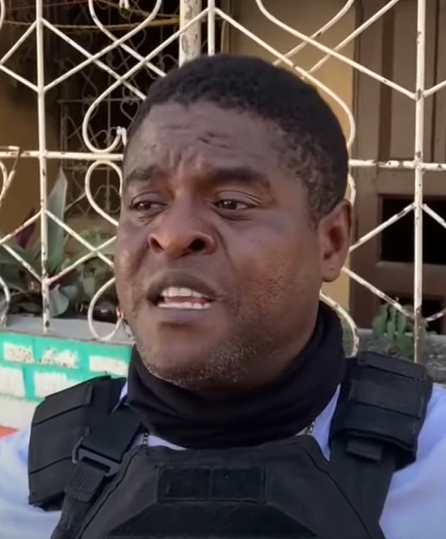As Haiti descends into chaos, with rival gangs calling for Prime Minister Ariel Henry to step down, one man has emerged as perhaps the most powerful figure in the country: Jimmy Cherizier, known by the nickname "Barbecue." The 46-year-old former police officer now leads the G9 Family and Allies, the most powerful gang coalition in Haiti.
"The people are desperate. They're in a desperate situation," said former NFL star Jack Brewer, who has worked in Haiti for over a decade on various causes. Brewer, now the chairman of the Jack Brewer Foundation and a board member of the GEO Group, spoke to Fox News Digital about the dire situation in the country.
Cherizier's notorious reputation began even during his time in law enforcement, with allegations linking him to the 2018 La Saline massacre, which claimed at least 71 lives and burned down 400 homes. The incident earned him the nickname "Barbecue," though Cherizier claims it originated from his mother's work as a fried chicken street vendor.
Mark Montgomery, a senior fellow at the Foundation for Defense of Democracies, explained that Haiti's gangs are more akin to old American gangs of the 19th century that tried to run neighborhoods in New York City, or modern-day Mexican drug cartels. Cherizier's gang, however, is potentially the most powerful of the hundreds operating in Haiti, with control over both maritime and aviation checkpoints, allowing for revenue streams from ransom payments and the ability to import large amounts of weapons.
This control also enables Cherizier to benefit from the substantial U.S. aid flowing into Haiti, with Montgomery arguing that it is inevitable some of that money and assistance will fall into the hands of gangs.
Recently, Cherizier's ambitions have grown even greater, with the gang leader stating that his ultimate goal is to overthrow Henry's government. He warned that continued international support for the prime minister would "lead us directly to a civil war which will end in genocide."
Henry, who initially agreed to resign last month, traveled abroad to seek support for a United Nations peace-keeping force to combat gang violence in Haiti. He has since been held up in the Dominican Republic, where he again vowed to step down once a transition of power is in place.
Montgomery suggested that the instability in Haiti may be part of Cherizier's strategy, as the gang leader "flourishes on instability" and could seek to "keep the country as unstable as possible." While Cherizier occasionally engages in actions that suggest he wants popular support, such as redistributing wealth, Montgomery noted that his "methodology" would not provide him with a clear path to becoming prime minister or president.
Eddy Acevedo, the chief of staff to the president and CEO of the Woodrow Wilson International Center for Scholars and a former national security adviser for USAID, argued that the situation in Haiti has been deteriorating for years, even before the assassination of President Moïse. He emphasized that Cherizier, despite positioning himself as "a man of the people," has been responsible for numerous atrocities, leading to sanctions by the U.S., Canada, and the U.N. Security Council.
Brewer, however, contended that Cherizier benefits from significant popular support, with a large portion of the country loving him for the care and support he provides. He argued that U.S. and international leaders fail to understand the realities on the ground, leading to failed policies that will continue to exacerbate the migrant crisis at the U.S. southern border.
In Brewer's view, the only solution is U.S. military intervention, which he believes could easily defeat the gangs and restore stability to Haiti. "We're talking about funding Ukraine, we need to be funding this scenario that's on our border," Brewer said. "I think it would take us three days. I think in three days you could have all of these thugs wiped out and stability back."
He further advocated for a "Corps of Engineers" to provide a foundation for the country to rebuild and help its people acquire critical skills for a brighter future. "If you don't do that, you'll never rebuild this nation," Brewer said. "That's where all of our money should be going, not to these other far-fetched ideas that may work in other countries."
As Haiti grapples with the growing power of gangs and the threat they pose to the country's stability, the international community faces the challenge of finding effective solutions to address the complex political, economic, and security issues that have long plagued the nation.






